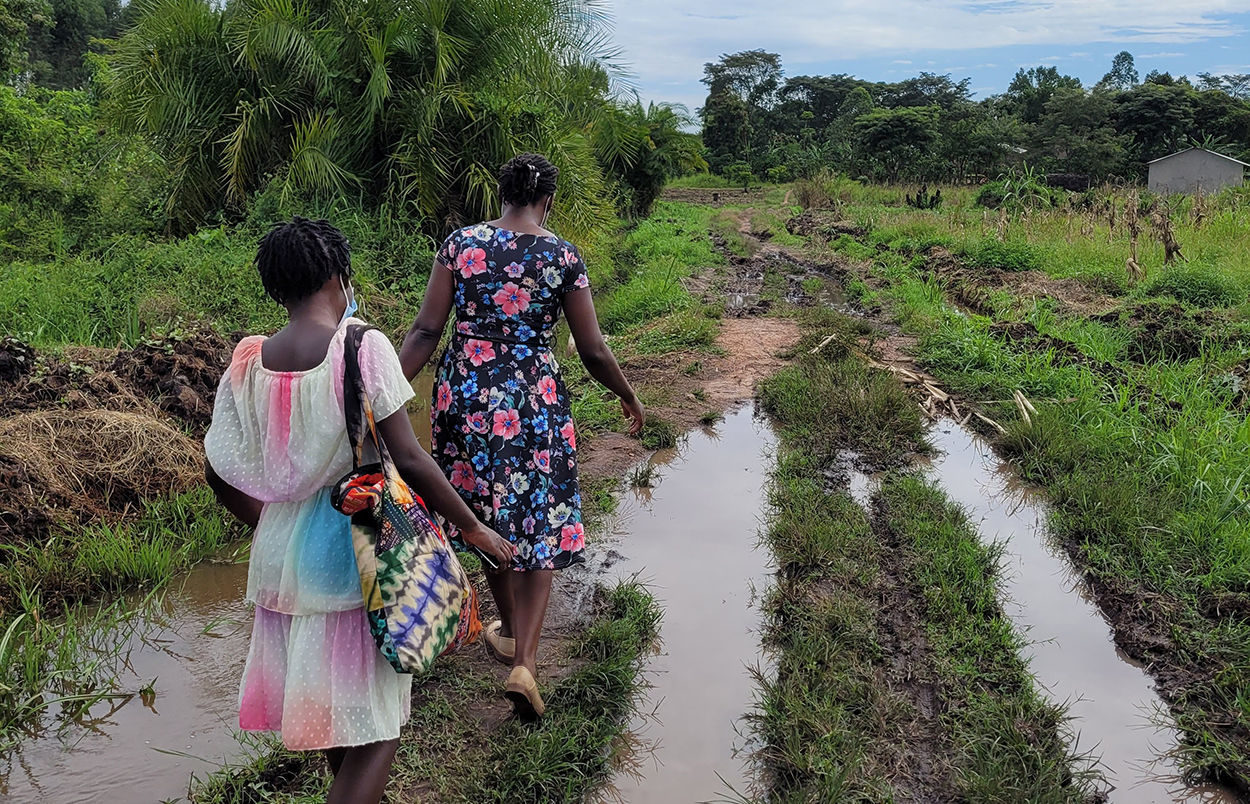Persistent pandemics: Alum lung researcher studies long-term impacts for global health
When COVID-19 arrived in Uganda, Peter Jackson, M’11, adapted his tuberculosis research in an unexpected way

When COVID-19 arrived in Uganda, Peter Jackson, M’11, shifted his global health research to study how the pandemic disrupted access to care for patients with tuberculosis. While COVID-19 was a worldwide issue, “lower- and middle-income countries have persistent pandemics. Anytime an outbreak occurs, they have public health measures like transportation lockdowns — and that has profound effects on every other health care issue they are facing.” (Contributed photo)
For nearly a decade, Peter Jackson, M’11, has been studying pulmonary health and non-infectious lung diseases in Africa.
He helped start a bronchoscopy suite to diagnose and treat lung disease in Uganda – the first training program of its kind in the country – partnering with the American Association of Interventional Pulmonary Program Directors. As a Fogarty Global Health Scholar with Johns Hopkins University in 2019, he lived in Uganda and investigated the high rates of abnormal lung function in rural and urban Ugandans.
Yet when COVID-19 arrived and he had to return home, Jackson saw an opportunity to adapt his research to the pandemic — though not in the way some might expect.
While living in Uganda, Jackson routinely cared for tuberculosis patients and saw the devastating effect of this disease on the community. When COVID-19 began spreading worldwide, Jackson became deeply concerned about how the pandemic would disrupt TB patients’ access to care.
In 2020, he was named the first recipient of the Research Grant in COVID and Diversity offered by the American Thoracic Society in partnership with the CHEST Foundation. His research found that transportation lockdowns created a large barrier to care, and it appeared that people living in rural areas were at the highest risk. Meanwhile, patients with both HIV and TB had higher rates of continued access, perhaps due to better continuity of care through well-funded HIV treatment programs.
“We think of COVID as this worldwide issue, but lower- and middle-income countries have persistent pandemics,” says Jackson, now an assistant clinical professor in the VCU Department of Internal Medicine. “Anytime an outbreak occurs, they have public health measures like transportation lockdowns — and that has profound effects on every other health care issue they are facing.”
Thanks to a grant from the Pulmonary Fibrosis Foundation, he’s now studying the causes of post-tuberculosis lung impairment, which affects up to half of treated patients and leads to lifelong symptoms and disability.
Internal Medicine Department Chair Patricia Sime, M.D., says external research funding uniquely positions Jackson to better tackle the barriers to access that these countries may be facing.
“Funding is challenging for research so this type of grant award helps innovative researchers like Dr. Jackson keep moving forward and making an impact for patients around the world,” says Sime, a lung disease expert and the William Branch Porter Professor of Medicine. “His work continues to shine a light on the struggles of patients with lung disease – even that which is unrelated to COVID-19 – and how the pandemic influences their care.”
Jackson hopes his research will help local medical providers allocate their limited resources where they can be most effective. For instance, they might provide transportation to clinics or medication delivery to those most at-risk for a lapse in care.
In fact, an undercurrent of his research — whether Jackson is studying lung function or access to care — is finding solutions that last well beyond his time on-site.
Moving away from the ‘parachute health’ approach
Jackson’s first introduction to global health came in 2014 during his residency at Yale University. He traveled to Monrovia, Liberia, as a Johnson and Johnson Global Health Scholar, attending on wards and teaching medical students at John F. Kennedy Hospital.
While there, the region had the first cases of the devastating Ebola outbreak. Jackson witnessed the disparities in care that people had to navigate, and upon returning home experienced how the disease decimated the Liberian medical community when many of his in-country mentors died.
“That struck home that there are places with significant challenges to delivering high-quality care and they continually have events that make it even more challenging,” he says. “It sparked a desire in me to try to help. If there are human beings — who have families and hopes and dreams — who are getting such inadequate care that their life expectancy is 50, then it's our job as doctors to figure out sustainable solutions.”
That’s a message he continues to share with VCU medical students as he introduces them to global health through work on his research projects or as a faculty member for the School of Medicine’s ACCESS Program, which equips students to practice in low-resource and international settings. He also teaches a global health and equity course open to all MCV Campus students and upper-level VCU undergraduates.
“The way global health has been taught in the past is what we would now call parachute health, where you drop in, have a clinic, and then you leave without a sustainable plan or without trying to research what a community needs,” Jackson says. “My lectures seek to confront that and highlight the idea that the needs of a community are known by the community. Our role is to provide expertise and resources that they need, but we won’t know unless we ask them.”
The VCU Pulmonary Critical Care Global Health Program is dedicated to research and capacity building at home and abroad. Support the program’s important work with an online gift to VCU Global Health.